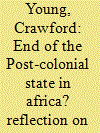| Srl | Item |
| 1 |
ID:
051889


|
|
|
|
|
| Publication |
Jan 2004.
|
| Summary/Abstract |
Ten years after the 1994 Rwandan genocide occurred, serious questions remain about the circumstances of the British government's response. This article critically evaluates the response of John Major's government to the genocide. It does so in four stages. The first section provides a brief overview of the Major government's international agenda in 1994, focusing on British policy towards the war in Bosnia and the African continent in general. The second section deals with the substance of Britain's Rwanda policy, while the third discusses the ways in which this policy has been almost totally omitted from mainstream accounts of this period. The final section provides a critical evaluation of some of the tactics that British officials employed to avert criticism of their government's policies. Based on the evidence presented we conclude that the British government displayed a deeply troubling indifference towards the victims of Rwanda's genocide.
|
|
|
|
|
|
|
|
|
|
|
|
|
|
|
|
| 2 |
ID:
051890


|
|
|
|
|
| Publication |
Jan 2004.
|
| Summary/Abstract |
Examination of the political trajectory of African states since the terminal colonial period suggests that, by the 1990s, the 'post-colonial' label still widely employed was losing its pertinence. The term acquired widespread currency not long after independence in acknowledgment of the importation into new states of the practices, routines and mentalities of the colonial state. These served as a platform for a more ambitious form of political monopoly, whose legitimating discourse was developmentalism. The colonial state legacy decanted into a patrimonial autocracy which decayed into crisis by the 1980s, bringing external and internal pressures for economic and political state reconfiguration. But the serious erosion of the stateness of many African polities by the 1990s limited the scope for effective reform and opened the door for a complex web of novel civil conflicts; there was also a renewed saliency of informal politics, as local societies adapted to diminished state presence and service provision. Perhaps the post-colonial moment has passed.
|
|
|
|
|
|
|
|
|
|
|
|
|
|
|
|
| 3 |
ID:
051891


|
|
|
|
|
| Publication |
Jan 2004.
|
| Summary/Abstract |
After decades of cycling violence between Hutu and Tutsi groups in Rwanda and Burundi, violence peaked in 1994 with a genocide of Tutsis in Rwanda, during which the Hutu majority slaughtered 800,000 Tutsi and moderate Hutus, leaving the country with 120,000 accused génocidaires awaiting trial. Rwanda's gacaca courts were established as a response to the backlog of untried genocide cases. These courts disturbingly distinguish between genocide and war crimes committed during the same era, trying only those accused of genocide. This article argues that the gacaca process will contribute to the insecurity of all Rwandan citizens in the future, since it pursues inequitable justice, accentuates the ethnic divide and will be interpreted as revenge.
|
|
|
|
|
|
|
|
|
|
|
|
|
|
|
|